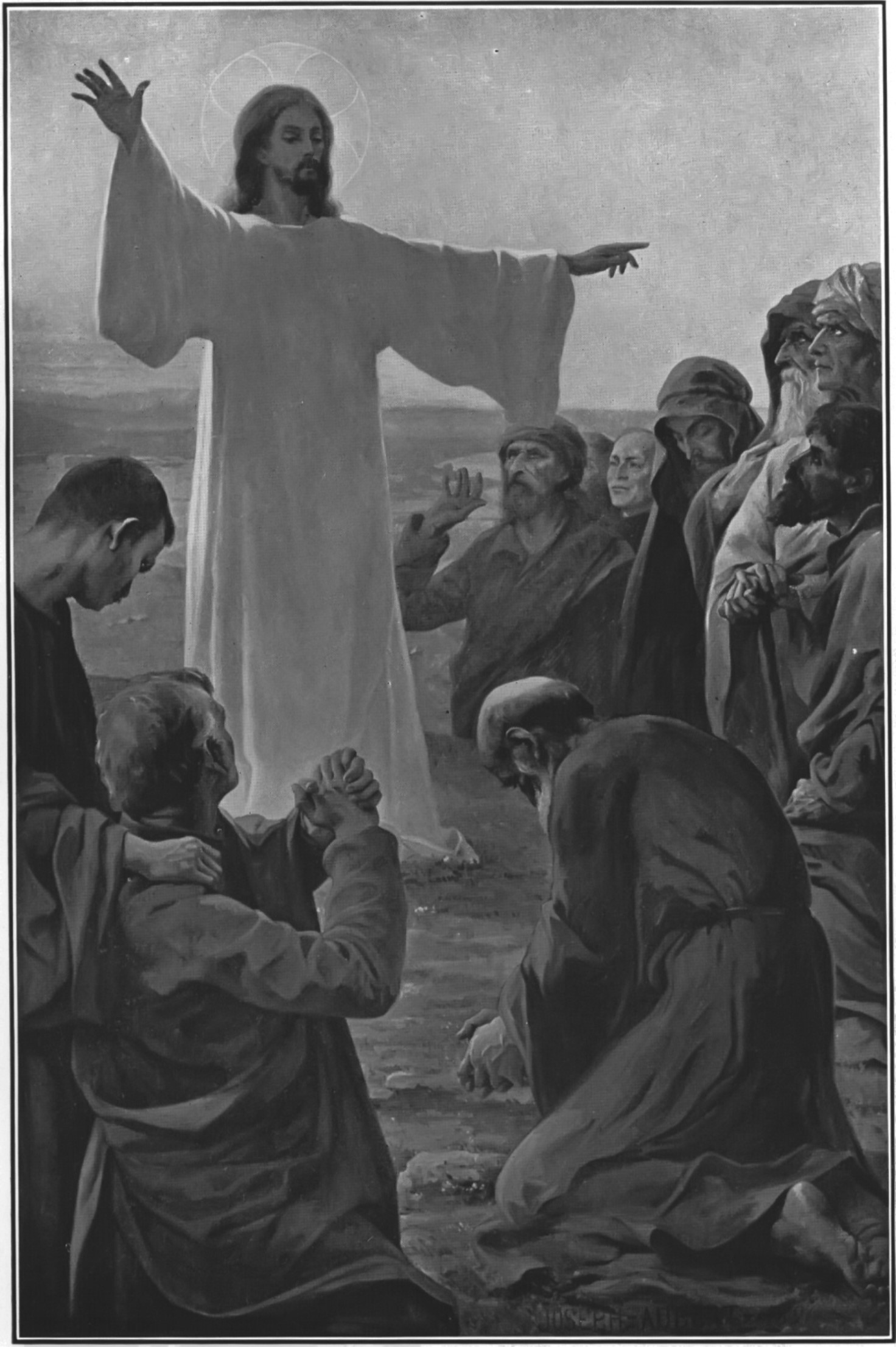From 1 Timothy 1-6
 Paul gives a before and after picture of his life in relation to the mercy God has shown him through Christ. He considers himself the foremost of sinners. One who persecuted the church and had many executed. But he received mercy. This mercy changed him and set an example to all sinners who have yet to believe that God can and will forgive them as well.
Paul gives a before and after picture of his life in relation to the mercy God has shown him through Christ. He considers himself the foremost of sinners. One who persecuted the church and had many executed. But he received mercy. This mercy changed him and set an example to all sinners who have yet to believe that God can and will forgive them as well.
This post is part of my bible in a year series.
Passage and Comments
I’ve chosen today’s passage because of 1 Tim 1.15. Its a tricky verse which I believe can be used and abused. Here’s my take on it.
8 Now we know that the law is good, if one uses it lawfully, 9 understanding this, that the law is not laid down for the just but for the lawless and disobedient, for the ungodly and sinners, for the unholy and profane, for those who strike their fathers and mothers, for murderers, 10 the sexually immoral, men who practice homosexuality, enslavers, liars, perjurers, and whatever else is contrary to sound doctrine, 11 in accordance with the gospel of the glory of the blessed God with which I have been entrusted. (1 Tim 1.8-11)
Lets note at the start Paul makes a distinction between;
- the ‘just’ (Gk. dikaiō) and
- the lawless and disobedient, the ungodly and sinners, the unholy and profane, etc.
Paul’s description of these two types of people is typical of the same distinction used by many if not all authors of scripture. Paul is no different (cf. 1 Thes 2.10).
12 I thank him who has given me strength, Christ Jesus our Lord, because he judged me faithful, appointing me to his service, 13 though formerly I was a blasphemer, persecutor, and insolent opponent. But I received mercy because I had acted ignorantly in unbelief, 14 and the grace of our Lord overflowed for me with the faith and love that are in Christ Jesus. (1 Tim 1.12-14)
We should note here Paul’s depiction of his former life followed by, ‘but I received mercy’. Paul is differentiating the time when he was a blasphemer, persecutor and an insolent opponent, with the time afterward when he received mercy. Paul did not remain a blasphemer, persecutor and insolent opponent of the church. Neither does he continue to think of himself that way.
Paul says he received mercy because, he acted ignorantly in unbelief. He then describes what happened after he received mercy. Grace and love overflowed for him. So we have a three part timeline.
- Paul was a blasphemer, persecutor and insolent opponent of the church,
- But, He received mercy (because he acted ignorantly in unbelief), then
- the grace of the Lord overflowed for him with faith and love.
15 The saying is trustworthy and deserving of full acceptance, that Christ Jesus came into the world to save sinners, of whom I am the foremost. 16 But I received mercy for this reason, that in me, as the foremost, Jesus Christ might display his perfect patience as an example to those who were to believe in him for eternal life. 17 To the King of the ages, immortal, invisible, the only God, be honor and glory forever and ever. Amen. (1 Tim 1:15-17)
Notice the repetition of the expression ‘but I received mercy’.
 First and importantly, Jesus saves sinners (see the diagram below). According to the distinction scripture makes between ‘sinners’ and ‘the righteous’, everyone is a ‘sinner’ before they are saved and justified (C2). Then through Christ’s death on the cross they are described as being ‘made righteous’ (Rom 5.19).
First and importantly, Jesus saves sinners (see the diagram below). According to the distinction scripture makes between ‘sinners’ and ‘the righteous’, everyone is a ‘sinner’ before they are saved and justified (C2). Then through Christ’s death on the cross they are described as being ‘made righteous’ (Rom 5.19).
If we consider as well Jesus’ first appearing, Jesus did not go to ‘the righteous’ but to the ‘sinners’ (Lk 15.1-7). Jesus did not go to the people who made a practice of the Jewish law. Jesus went to the rejects of society. Those who were publically known to reject the Jewish lifestyle. Remember the distinctions Paul makes above (1 Ti 1.8-11) between the ‘just’ and the ‘sinners’, he is thinking along the same lines.
Jesus came and saved sinners, among whom Paul describes himself as the foremost of sinners. Paul refers to himself in the present tense, calling himself a sinner. The rationale for Paul in saying this is that he is owning up to his former sins. He remembers and grieves over his former behaviour as a blasphemer, persecutor and insolent opponent.
‘But’, there is that word again that separates two stages in time, ‘But I received mercy’ he says. While Paul refers to himself in the present as a sinner, this statement differentiates two periods in his life. He is recalling his sinful behaviour before the time he received mercy and the time now after he has received mercy. Paul still remembers and grieves over his former behaviour. Paul is still the same person who committed those sins in ignorance, which is why he calls himself a ‘sinner’ but his intention is not to infer by this statement he thinks of himself to be continuing in sin (e.g. 1 Cor 4.4).
In addition to his ignorance, Paul gives another reason why he received mercy. When people come to believe Jesus is the Christ but think they are too horrible to be saved. They only need consider Paul’s former sinful life and realise that it was in this state that he received mercy. Paul presents himself as proof that God is willing to give sinners mercy.
So like before the three stage process looks like this;
- Christ Jesus came into the world to save sinners, of whom Paul describes himself as the foremost
- But, he received mercy
- He is now used as an example for those who have yet to believe Jesus shows mercy to sinners while in unbelief.
If I table them together;
| though formerly I was a blasphemer, persecutor, and insolent opponent | The saying is trustworthy and deserving of full acceptance, that Christ Jesus came into the world to save sinners, of whom I am the foremost |
| But I received mercy | But I received mercy |
| because I had acted ignorantly in unbelief, and the grace of our Lord overflowed for me with the faith and love that are in Christ Jesus (1 Tim 1.12-14) | for this reason, that in me, as the foremost, Jesus Christ might display his perfect patience as an example to those who were to believe in him for eternal life. (1 Tim 1.15-16) |
Consider first Corinthians where Paul describes this transition in his life as well.
[9] For I am the least of the apostles, unworthy to be called an apostle, because I persecuted the church of God. [10] But by the grace of God I am what I am, and his grace toward me was not in vain. On the contrary, I worked harder than any of them, though it was not I, but the grace of God that is with me. (1 Cor 15:9-10)
What this passage implies is that if Paul continued as a sinner persecuting the church of God, God’s grace would have been in vain. That is, had no effect.
Consider in Acts how Paul thinks of himself after his conversion.
[23:1] And looking intently at the council, Paul said, “Brothers, I have lived my life before God in all good conscience up to this day.” (Acts 23:1)
Are these the statements of someone who thinks of himself persisting in sin as the ‘foremost of sinners’?
“Interestingly, although the New Testament gives extensive evidence that believers sin, it never clearly identifies believers as “sinners.” Paul’s reference to himself in which he declared, “I am foremost” of sinners is often raised to the contrary (1 Tim 1:15). …
Despite the use of the present tense by the apostle, several things make it preferable to see his description of himself as “the foremost of sinners” as a reference to his preconversion activity as an opponent of the gospel.
First, the reference to himself as “sinner” is in support of the statement that “Christ Jesus came into the world to save sinners” (v. 15 {1 Tim 1:15}). The reference to “the ungodly and sinners” a few verses earlier (v. 9) along with the other New Testament uses of the term “sinners” for those who are outside of salvation (George W. Knight, The Pastoral Epistles (Grand Rapids: Eerdmans, 1992), 101.) shows that he was referring to “sinners” whom Christ came to save rather than believers who yet sinned.
Second, Paul’s reference to himself as a “sinner” is followed by the statement, “And yet I found [past tense] mercy” (v. 16), clearly pointing to the past occasion of his conversion. Paul was grateful for God’s mercy toward him, “the foremost of sinners.”
A similar present evaluation of himself based on the past is seen when the apostle wrote, “I am [present tense] the least of the apostles, who am not fit to be called an apostle, because I persecuted the church of God” (1 Cor 15:9).
Because of his past action, Paul considered himself unworthy of what he presently was by God’s grace and mercy, an apostle who was “not in the least inferior to the most eminent apostles” (2 Cor 11:5; cf. 12:11 {2 Cor 12:11}).
Declaring that he was “the foremost of sinners,” the apostle also declared that Christ had strengthened him for the ministry, having considered him “faithful” or “trustworthy” for it, to which He had called him (1 Tim 1:2).
As Knight concludes, “Paul regards this classification of himself as `foremost of sinners’ as still valid (eijmi, present tense); though he is fully forgiven, regarded as faithful, and put into service, he is still the notorious opponent who is so received.” (Knight, The Pastoral Epistles, 102.)
Thus the apostle was not applying the appellation “sinner” to himself as a believer, but rather in remembrance of what he was before Christ took hold of him.” ‘Sinners’ who are forgiven or ‘Saints’ who sin? – Robert Saucy
Jesus Christ died and was raised to new life for us.
Christian identity should be shaped by who Jesus is and the core events of his first appearance. Not by sin.
God’s people are called ‘Christians’ because they kept on declaring Jesus is the Christ.
We are instructed to consider ourselves dead to sin and alive to God because of what Jesus has done. Christian identity should be shaped by Jesus’ death and resurrection (Rom 6.11). Not by sin.
For Believers

What this passage should call us to do, is to help unbelievers consider the lives before and after of those who have been saved. When they understand that those who have been saved formerly lived sinful lives before they were saved, it should give them hope that Jesus – who they know is Christ and Judge – can and will save them as well.
Copyright © Joshua Washington and thescripturesays, 2014. All Rights Reserved.


